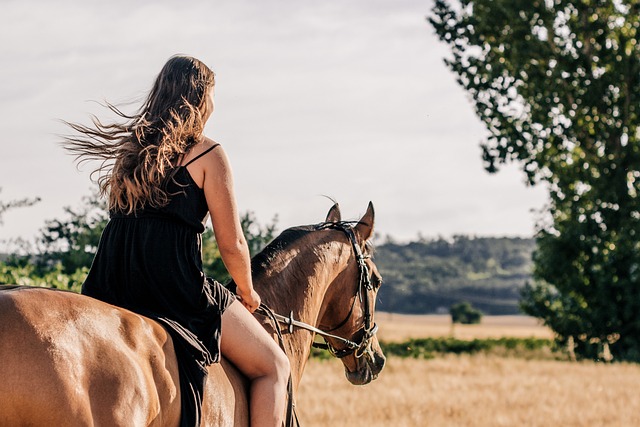As an avid horseback rider myself, I understand the excitement and apprehension that comes with the question, “Can you horseback ride while pregnant?” It’s a subject that’s close to my heart, and I’m thrilled to share my insights and research with all of you in this friendly guide.
Based on doctor recommendations, it is not safe to ride a horse while pregnant. The American College of Obstetricians and Gynecologists advises against activities with a high risk of falling or abdominal trauma. Hormonal changes during pregnancy can also increase the risk of ligament loosening, making horseback riding unsafe for expectant mothers.
Pregnancy is a miraculous and transformative journey, and it’s natural to wonder how it may impact our passions and hobbies, especially ones as exhilarating as horseback riding. Throughout this article, I’ll delve into the nitty-gritty of riding during pregnancy, touching on the potential risks, benefits, and safety precautions you should consider.
While I’m not a medical professional, I want to emphasize the importance of seeking advice from your healthcare provider before making any decisions about riding during pregnancy. Every pregnancy is unique, and their professional guidance is invaluable in ensuring both your health and the well-being of your little one.
Let’s get started!
Understanding the Risks and Benefits of Horseback Riding During Pregnancy
When it comes to horseback riding during pregnancy, it’s essential to have a clear understanding of both the risks and potential benefits involved. While riding can be a thrilling and rewarding activity, being pregnant introduces unique considerations that we need to be mindful of. Let’s take a closer look at the risks and benefits:
Potential Risks
- Impact on Pelvic Area and Joints: As your body undergoes changes during pregnancy, your pelvic area and joints become more flexible due to hormonal influences. This increased flexibility can make you more susceptible to injuries if you experience a fall while riding.
- Risk of Falling and Injury: Horseback riding involves a level of inherent risk, even for experienced riders. While accidents are never entirely predictable, the risk of falling off a horse during pregnancy can be more concerning due to the potential impact on your abdomen.
- Strain on Abdominal Muscles: Riding may exert pressure on your abdominal muscles, which can be uncomfortable or potentially problematic, especially as your baby grows and your belly expands.
Potential Benefits
- Physical Exercise and Cardiovascular Health: Horseback riding can provide a moderate form of physical exercise that helps maintain cardiovascular health and muscular strength, as long as you engage in it safely and within your limits.
- Emotional Well-being and Stress Reduction: For many equestrians, being around horses and riding brings a sense of peace and joy. During pregnancy, these positive emotions can contribute to overall emotional well-being and stress reduction.
- Bonding with Your Horse and Connecting with Nature: Horses have an incredible ability to form deep connections with their riders. Continuing to ride during pregnancy can maintain and strengthen the bond you share with your equine companion, fostering a sense of comfort and connection during this transformative time.
Balancing the Risks and Benefits
The decision to horseback ride while pregnant is a personal one, and it’s crucial to find a balance that prioritizes your safety and the well-being of your baby. Before making any decisions, consult with your healthcare provider to assess your individual health status, any existing pregnancy complications, and overall fitness level.
Additionally, consider the type of riding you engage in, your riding experience, and the temperament of your horse. Adopting appropriate safety measures, modifying your riding style, and being attentive to your body’s signals can help minimize potential risks.
Remember, every pregnancy is unique, and there is no one-size-fits-all answer. Ultimately, your well-being and that of your baby are the top priorities.
Consulting Your Healthcare Provider
One of the most crucial steps in determining whether you can horseback ride during pregnancy is consulting your healthcare provider. Your doctor or midwife is your best source of guidance, as they possess knowledge of your medical history and can assess your individual health and pregnancy status. Here’s what you need to know about this essential step:
- The Importance of Professional Advice:
- Your healthcare provider has expertise in prenatal care and can provide valuable insights into how pregnancy may impact your ability to ride.
- They can assess any potential risk factors or complications that may influence your decision to continue horseback riding.
- Discussing Your Riding Experience and Health Status:
- Share your riding experience with your healthcare provider, including how often you ride and the type of riding you engage in (e.g., casual trail riding, competitive riding).
- Communicate any pre-existing medical conditions that may affect your ability to ride safely during pregnancy.
- Addressing Any Complications or High-Risk Factors:
- If you have any pregnancy complications or are considered high-risk, discuss these with your healthcare provider to determine if horseback riding is advisable.
- Certain medical conditions, such as placenta previa or a history of premature labor, may necessitate refraining from riding.
- Understanding the Medical Recommendations:
- Your healthcare provider will provide personalized advice based on your specific situation.
- Respect their recommendations and ask any questions you may have to ensure you fully understand the reasoning behind their advice.
Remember, the primary goal of consulting your healthcare provider is to make informed decisions that prioritize the safety and well-being of both you and your baby. Be open and honest during the conversation, and don’t hesitate to share any concerns or uncertainties you may have. Their professional guidance will empower you to make the best choice for yourself and your growing family.
If your healthcare provider advises against horseback riding during pregnancy, consider alternative activities that allow you to stay connected with your horse while reducing the risks. But if they approve, with the necessary precautions in mind, you can continue enjoying the wonderful world of horseback riding as you embark on this exciting journey into motherhood.
Safety Precautions and Tips for Horseback Riding While Pregnant
When it comes to horseback riding while pregnant, safety should always be your top priority. Taking the necessary precautions and adopting a mindful approach can help reduce potential risks and ensure a more enjoyable experience. Here are 10 essential safety tips to consider.
- Riding Gear and Apparel:
- Wear a properly fitted and certified equestrian helmet at all times when mounted.
- Opt for comfortable and supportive riding boots to reduce the risk of foot and ankle injuries.
- Consider wearing a protective riding vest to cushion potential impacts.
- Choosing the Right Horse:
- Select a well-trained, gentle, and predictable horse for your rides.
- Avoid riding young or green horses that may be more unpredictable.
- Suitable Riding Locations and Terrains:
- Choose riding environments that are familiar to you and your horse.
- Avoid rough or uneven terrains that may increase the risk of falls.
- Modifying Your Riding Style and Activities:
- Stick to gentle gaits, such as walking and slow trotting, to minimize bouncing and jarring.
- Avoid high-impact movements, such as jumping or galloping.
- Reduce the duration of your rides and gradually adjust your riding routine as your pregnancy progresses.
- Properly Mounting and Dismounting Techniques:
- Use a mounting block or assistance from someone to mount and dismount safely.
- Be mindful of your changing center of gravity as your pregnancy advances.
- Riding with a Companion or Instructor:
- Whenever possible, ride with a companion who is aware of your pregnancy and can assist in case of an emergency.
- Consider taking lessons with a qualified instructor who understands the specific needs of pregnant riders.
- Staying Hydrated and Taking Breaks:
- Drink plenty of water before, during, and after riding to stay hydrated.
- Take frequent breaks to rest and avoid becoming fatigued.
- Listen to Your Body:
- Pay attention to any discomfort, pain, or signs of fatigue while riding.
- If you feel unwell or experience pain, stop riding and seek medical advice.
- Avoid Riding in Extreme Weather:
- Extreme heat or cold can be more challenging for pregnant riders. Opt for milder weather conditions.
- Communicate with Your Healthcare Provider:
- Keep your healthcare provider informed about your riding activities and any concerns you may have.
Remember, every pregnancy is different, and what may be safe for one expectant mother may not be suitable for another. Always follow the guidance of your healthcare provider, and be willing to adapt your riding routine as needed. The key is to maintain a positive and safe riding experience that benefits both you and your unborn child while cherishing the bond you share with your horse throughout this incredible journey.
Best Practices for Each Trimester
As your pregnancy progresses, your body undergoes significant changes, and it’s essential to adapt your horseback riding practices accordingly. Let’s explore the best practices for each trimester to ensure a safe and enjoyable riding experience:
First Trimester
- Coping with Morning Sickness and Fatigue:
- If you experience morning sickness, plan your rides during times when you feel most comfortable and less nauseous.
- Listen to your body and rest when needed, as fatigue can be more pronounced during the first trimester.
- Adapting to Changes in Balance and Coordination:
- Be mindful of changes in your balance and coordination caused by hormonal fluctuations.
- Practice mounting and dismounting with care to maintain stability.
Second Trimester
- Dealing with Expanding Belly and Weight Distribution:
- As your belly grows, you may need to adjust your riding position slightly to accommodate your changing weight distribution.
- Consider using a maternity riding belt or belly band for added support and comfort.
- Safeguarding Against Round Ligament Pain:
- Avoid sudden or jerky movements that may strain the round ligaments supporting your uterus.
- Engage in gentle warm-up exercises before riding to prepare your muscles and ligaments.
Third Trimester
- Managing Decreased Mobility:
- As your pregnancy advances, you may experience reduced mobility and flexibility.
- Focus on slower and more controlled movements during riding.
- Preparing for Impending Labor:
- As your due date approaches, you may need to reduce the frequency and intensity of your rides.
- Riding at a walk can still provide valuable bonding time with your horse while being gentle on your body.
General Tips for All Trimesters
- Regularly Check In with Your Healthcare Provider:
- Keep your healthcare provider informed about your riding activities, and follow their advice regarding riding modifications.
- Stay Hydrated and Take Breaks:
- Drink plenty of water before, during, and after riding to stay hydrated.
- Take frequent breaks to rest and avoid overexertion.
- Wear Comfortable and Supportive Gear:
- Choose riding gear that accommodates your changing body and provides adequate support.
- Be Mindful of Your Horse’s Behavior:
- Pay attention to your horse’s behavior and mood, as they may sense your pregnancy and react differently.
- Listen to Your Body:
- If you feel any discomfort, pain, or dizziness while riding, stop immediately and seek medical advice if necessary.
Remember, pregnancy is a beautiful and delicate time, and the safety and well-being of both you and your baby are of utmost importance. Always consult your healthcare provider and make adjustments to your riding routine as needed throughout each trimester. Enjoy the precious moments spent with your horse while nurturing your pregnancy in a safe and responsible manner.
Alternative Activities to Stay Connected with Your Horse
While horseback riding may need to be adjusted or temporarily paused during pregnancy, there are plenty of alternative activities that allow you to stay connected with your horse and continue fostering your special bond. Here are 8 wonderful options to consider:
- Groundwork and Lunging Exercises:
- Engage in groundwork exercises with your horse, such as lunging, long-lining, or liberty work.
- These activities help maintain communication and trust between you and your horse while providing light exercise for them.
- Light Grooming and Bonding Sessions:
- Spend quality time grooming your horse regularly.
- Grooming not only keeps your horse’s coat healthy but also deepens the emotional connection between you both.
- Participating in Horse Care and Stable Chores:
- Help with stable chores and horse care, such as feeding, mucking stalls, and turning out horses.
- Being actively involved in your horse’s daily routine strengthens the bond and ensures they know you’re still there for them.
- Handwalking and Handgrazing:
- Take leisurely walks with your horse, hand in hand, around the stable or grazing areas.
- Enjoy peaceful moments together while being mindful of your body’s needs and limitations.
- Equine-Assisted Therapy or Classes:
- Explore equine-assisted therapy or classes specifically designed for pregnant women.
- These activities can offer a unique and therapeutic way to interact with horses while focusing on relaxation and mindfulness.
- Watching Training Sessions and Shows:
- Attend training sessions or horse shows to support your horse and observe their progress.
- Being present during these events allows you to stay involved in the equestrian world.
- Building an Equine Library:
- Use this time to build your knowledge about horse care, training, and equine behavior.
- Reading books and watching educational videos can deepen your understanding of horses and horsemanship.
- Connecting with Fellow Equestrians:
- Join equestrian forums or local horse-related groups to connect with other horse lovers.
- Sharing experiences and stories with like-minded individuals can be rewarding and uplifting.
Staying connected with your horse goes beyond riding. Embrace these alternative activities as opportunities to nurture your relationship and prepare for when you can saddle up again after your pregnancy journey. The bond between you and your horse will remain strong, and your shared experiences will be cherished memories that enrich your equestrian journey and motherhood.
Signs to Stop Horseback Riding and Seek Medical Attention
Knowing when to stop horseback riding and seek immediate medical attention is crucial to ensuring both your safety and the well-being of your baby. Here are some signs and symptoms that should prompt you to stop riding and consult with your healthcare provider:
- Abdominal Pain and Cramping:
- Experiencing severe or persistent abdominal pain or cramping while riding should be taken seriously.
- This could indicate potential complications that need immediate medical evaluation.
- Vaginal Bleeding or Discharge:
- Any vaginal bleeding or unusual discharge during pregnancy requires immediate medical attention.
- It may be a sign of potential pregnancy complications that should be promptly addressed.
- Contractions or Preterm Labor Symptoms:
- If you experience regular contractions or notice signs of preterm labor, such as pelvic pressure or lower back pain, stop riding immediately.
- Contact your healthcare provider to assess the situation and determine the best course of action.
- Dizziness or Fainting Spells:
- Feeling dizzy or faint while riding may indicate issues with blood pressure or circulation.
- Get off your horse and seek medical advice if these symptoms persist.
- Shortness of Breath:
- If you experience sudden or severe shortness of breath during or after riding, dismount immediately and seek medical attention.
- This could be a sign of respiratory or cardiovascular issues that need evaluation.
- Decreased Fetal Movement:
- Pay attention to your baby’s movements during and after riding.
- If you notice a significant decrease in fetal movement or changes in your baby’s normal patterns, contact your healthcare provider.
- Signs of Overexertion or Exhaustion:
- Listen to your body and avoid overexertion during riding.
- If you feel overly fatigued, lightheaded, or weak, it’s time to stop and rest.
- Any New or Unusual Symptoms:
- If you experience any new or concerning symptoms while riding, consult with your healthcare provider promptly.
- They can help determine if these symptoms are related to riding or require further evaluation.
If you encounter any of these signs or any other unexpected health issues while horseback riding, don’t hesitate to stop riding and seek immediate medical advice. It’s always better to err on the side of caution and protect the well-being of both you and your little one.
Conclusion
In conclusion, the best answer to the question “Can you horseback ride while pregnant?” depends on individual factors such as your health, riding experience, and any existing pregnancy complications. While some pregnant women may continue riding with modifications and proper safety measures, others may need to opt for alternative activities to ensure the well-being of both themselves and their babies.
It is essential to recognize that pregnancy is a delicate and transformative time, and safety should always be the primary concern. Seeking medical advice allows you to make informed decisions tailored to your specific circumstances.
Remember, staying connected with your horse goes beyond riding. Engaging in alternative activities, such as groundwork, grooming, and spending quality time together, fosters the unique bond between you and your equine companion throughout your pregnancy journey.
Ultimately, trust your instincts, listen to your body, and prioritize your health and that of your baby. By doing so, you can enjoy a safe and fulfilling pregnancy while cherishing your love for horses. Embrace this remarkable time in your life, and may the journey into motherhood be filled with joy, love, and beautiful moments with your beloved horse. Happy riding and a healthy pregnancy to all equestrian moms-to-be!
You may be interested in reading this article next: Can You Snowmobile While Pregnant?










